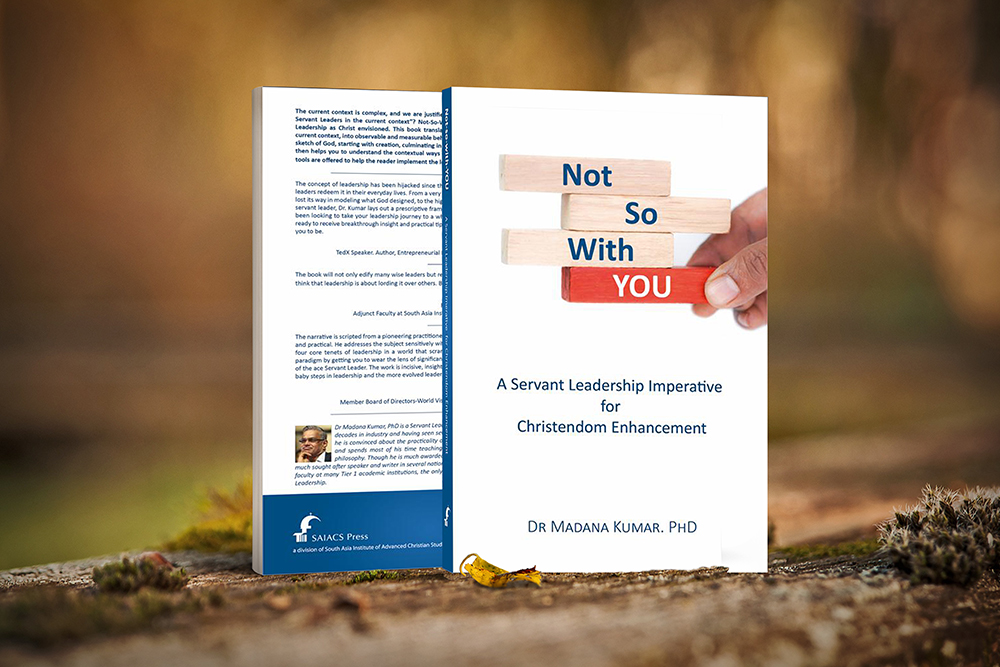About the Book
Not-So-With-You
A Servant Leadership Imperative for Christendom Enhancement
Dr. Madana Kumar, PhD
 The Need for this book
The Need for this book
The world is still passing through the most difficult years this generation has ever faced. The years 2020 and 2021. The Pandemic (COVID-19) has re-affirmed the desire for followers to look for more in their leaders. “New Normal” is a term we hear a lot these days. There are arguments and counter-arguments whether the New Normal has already come or are we still waiting for the New Normal to settle in. Will Church congregations be the same again? Will offices be the same ever again? Will the old normal ever return? Will we ever return to the hugs and handshakes and high fives and holding hands? We don’t have answers to those questions as I write this book. We don’t know when we will have any answers, if at all. But one thing is for sure, the way we influence people in the New Normal is and will be different from how we influenced them in the old normal.
 My studies reveal four tenets of Leadership for the New Normal. There are parallel Biblical Imperatives for each of those four tenets of Leadership for the New Normal.
My studies reveal four tenets of Leadership for the New Normal. There are parallel Biblical Imperatives for each of those four tenets of Leadership for the New Normal.
Tenet #1 is about Power. As all of us are aware, Leadership and Power have always been married. We have always associated leadership with power. However, human history shows that Leaders have often misused Power than use it for the benefit of others. So, that is the Tenet #1 for the New normal. The New Normal will transform the way leaders use power. The followers will not accept the Power Elite concept where power is concentrated in a few . People will look for Leaders who use power with them rather than over them. Socialised power, i.e., power that is used for society’s benefit, will be the ask as against individualized power where power is used for selfish motives. In corporates, employees will start looking for higher purpose than just profit. Organisation members will not tolerate power that is used to generate profits at any cost. The desire for goodness will increase, as will the forces against greed. This is the corporate trend that we see for the New Normal.
Tenet #2 is about Other-centered Leadership in the New Normal. What the pandemic has done is to make people realise that life has a higher purpose. Ironically, the lockdown and social distancing etc., has made us recognize our interdependence all the more. Now, more than ever, we know that the actions of someone else can harm us even if we are not at fault. That is what Tenet #2 is all about. Followers will not tolerate Self-centered leadership. The New Normal will demand that Leaders make leadership about others rather than about themselves.
Tenet #3 of Leadership in the New Normal is about living and leading by values. According to my studies, the followers will look for leaders who have a set of values and live by them. Again, the Bible is full of such commands and asks us to adhere to its laid down values.
Tenet #4 is about Success vs. Significance. People will ask that the success motive be replaced with a pursuit of Significance. The Biblical parallels are many. My studies show that in the New Normal, people will not follow leaders who have only success as their motive. The COVID-19 pandemic has taught us to ask, what have you done for others? And this trend will continue.
Due to these current trends, a new leadership paradigm is required in the New Normal. What is the leadership philosophy that encompasses all these and more? The world and, in particular the business world, came to recognize this way of leading as Servant Leadership. Robert Greenleaf, who coined the term Servant Leadership, did not acknowledge that this was from the Bible. The concept found acceptance in some corporates early on, but the pace of acceptance picked up as the business world moved more into the era of knowledge workers. Today there are several case studies of Servant Leadership applications in corporate organisations.
How about Christian Leaders? Christian Professionals? Christian entities? Churches, Para-church organisations, Faith based NGOs, Faith based businesses? Do they really follow Servant Leadership? Studies reveal that there is a gap. While many know about Servanthood, in applying it in organisations, and leading by obeying the not-so-with-you command of our Lord Jesus Christ, Christian entities have set more examples of failing than succeeding.
We can attribute this to the lack of resources on the “How” of Servant Leadership.
This book addresses this gap. This book focuses on how we can apply the Not-So-With-You command in our day to day lives, our families, our neighborhoods, and our workplaces.
Our Lord Jesus was clear in His instructions when He gave the Not-So-With-You command in Matt. 20:25-28. He confirmed this by setting an example and asking his disciples to do accordingly in John 13:13-17. But we are perplexed by the complexity of the current context and keep asking “What must we do to become Servant Leaders in the current context?” It is naïve to assume that we should pick up the basin and towel and walk around our homes or neighborhoods or offices. The answer is in our behaviours.
Why should you read this book?
This book examines the concept of Servant Leadership from a whole new angle of behaviours of Christians, individually, and in their organisational roles. It strives to provide guidelines in implementing Servant Leadership in one’s personal lives as well as in organisations, by addressing the following aspects;
- Conviction: It examines the progress of God’s Leadership Sketch through the Bible, providing a firm Foundation for the Convictionneeded for being a Servant Leader.
- Confession: The book considers Church History and highlights the mistakes our forefathers have made in not obeying the Not-So-With-You command of our Lord Jesus Christ. This makes it Confessional for the readers.
- Observable Behaviours: This book provides a set of 7 behaviours we call the DEEP BHC Behaviours that my research shows make a Servant Leader. This makes Servant Leadership Observablefor the readers.
- Self-Development: We map these DEEP BHC Behaviours to 10 attributes that will help us develop those behaviours as habits. All these behaviours and attributes are backed by Biblical examples and stories. This aids Self- Developmentof the readers.
- Personal: The addendum provides details of a 360-degree Survey (based on my Doctoral Thesis) on the DEEP BHC Behaviours. This makes Servant Leadership Personalfor the reader
- Practical:The addendum includes a Practice Guide to implement actions that the leader can arrive at based on the 360-degree assessment. This makes Servant Leadership Practical for the reader.
- Beneficial: A template is provided in the addendum to capture significant changes one can observe in oneself, and its impact on our life and work, after reading and taking action based on the book. This makes it Beneficialfor the reader.
- Supported: A training program is designed and rolled out based on this book. Readers can take part in, to journey further. This makes Servant Leadership Development Supportedfor the reader.
- Enduring: A Coaching support system is available to help readers convert their “good intentions” into tangible actions. This makes it Enduringfor the reader.
How to read this book!
This book is structured in three parts and an addendum.
- In Part 1, we journey through God’s Leadership sketch in the Bible, from Genesis to the Apostles; the highlight being the Not-So-With-You command of Jesus Christ.
- In Part 2, we peek at the darker side of Church History and study the lapses in following the Not-So-With-You command and the dire consequences of that disobedience.
- In Part 3, we turn the focus on ourselves and look at behaviours and attributes we need to develop to comply with the Not-So-With-You command of our Lord Jesus Christ.
- In the addendum, we offer several practical tools to convert the knowledge gained from this book into actions that will help us transform into Servant Leaders.
Please remember that this book is about you. The analysis of Biblical Characters and historic leaders is not given for us to take a judgmental attitude, or a holier-than-thou pat on the back. They are meant to encourage oneself to look within and see how close we are to some of them, and how easily we might do some of the things (or worse) that they did. Hence, while reading the Part 3 of the book, do keep going back to Part 1and 2 to look at the pitfalls of leadership, and ask, “What must we do so that we don’t fall into the same traps?”. That is why the addendum is inserted in the book. Use those tools to stay on track
Who will benefit from this book?
This book will benefit anyone interested in the topic of Leadership in general and Bible based leadership in particular. It will be of specific interest and benefit to the following group of readers:
- Leaders of faith-based organisations (Pastors, Leaders of Para-church organisations, Heads of NGOs, Heads of businesses). This will help them learn how to lead an entity.
- Members of faith-based organisations, immaterial of their position.
- Christian professionals working in secular entities. This will help them practice their faith and still be significant (not merely successful) in their personal lives and workplaces.
- Theology ttudents at Masters level: Institutions can prescribe/ recommend this as the textbook for leadership courses in seminaries. Many sections of this book have already been used in MA, MTh and DMin level classes on Leadership and found great acceptance. This book will become an excellent resource book for courses on Christian Leadership in Theological Education.
- Anyone who is interested in building up church community. This book is all about “preparing the bride for the bridegroom”. It is about making the church go back to the basics of Not-So-With-You command of Jesus and hence is abundantly poised to help build a church community that Jesus will be pleased to come back to.
- Anyone who has the passion for furthering Missions. Missions in the current context is all about building lasting relationships with those who do not know or experienced the Gospel yet. Missions cannot succeed without the right relationships. This book will help “missionaries” develop right behaviour that will make people want to relate and listen to you and the Gospel message that you are proclaiming.



